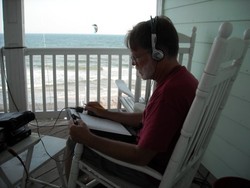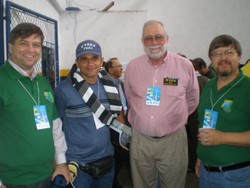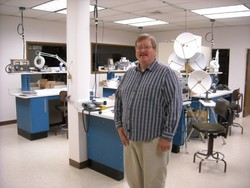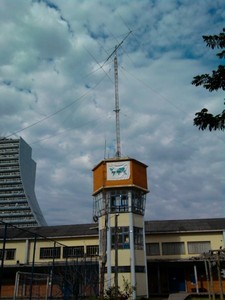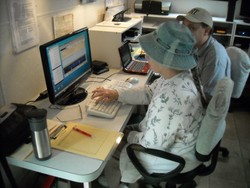 August 3, 2011 Editor: Ward Silver, NØAX | ||||||
IN THIS ISSUE
NEW HF OPERATORS - THINGS TO DO If working the Islands On the Air (IOTA) contest activated your foghorn, check out International Lighthouse-Lightship Week. The Worked All Europe (WAE) CW weekend also features a unusual and challenging "QTC" aspect of competition. Those of you new to ham radio in the past three years can enjoy the ARRL's first-ever RTTY version of the Rookie Roundup, too! BULLETINS
Your editor spent some time over the past couple of weeks rambling around the Eastern Seaboard to get a sample of that cool ocean-moderated summer weather...NOT! Triple-digit temps notwithstanding, the time spent in the vicinity of ARRL HQ and then on the North Carolina beach was most enjoyable. Thus, this issue is a mere shadow of its usual voluminous self but rest assured that the August 16th version will be back to normal. BUSTED QSOS Well, the Bumblebees didn't take flight until this past Sunday - I hope you caught a few in the Flight of the Bumblebees contest. I can't spell very well, either - it's Friedrichshafen and Phoenix. And the Rohn 9H50 push-up mast has a total extended height of 34 feet, not 50 feet. (Thanks, Jake K9WN) CONTEST SUMMARY Complete information for all contests follows the Conversation section Aug 6-7
Aug 13-14
You can watch the deployment of ARISSat-1 on NASA's website beginning at 1400 UTC on Wednesday, August 3, as two Russian cosmonauts undertake a six-hour spacewalk that will include the satellite's deployment. Expedition 28 Russian Flight Engineers Sergei Volkov, RU3DIS, and Alexander Samokutyaev will launch the satellite from the ISS near the beginning of the spacewalk. You can learn more in this ARRL website story and EDN magazine e-newsletter article.
The southern hemisphere's first-ever Contest University - Brasil was a big success! Held in Porto Alegre (PY3) the well-organized 1-1/2 day program of 18 classes attracted around 200 attendees including a number of unlicensed students from the host technical school whose club call sign in PY3MHZ. Faculty included K5ZD, K1DG, W3LPL, W9KNI, LU8ADX/AY8A, CX6VM/CW5W, and XE1KK. Local presenters included PU5AAD, PY3PR, PY3KD, PY5HSD, PY1NB, PP5JD, and PY5CC/PP5XX. You can see some of the happenings as YouTube videos (search for "CTU Brasil"), including top long-distance attendee PV8DXs video summary. CTU has now been held in Dayton, Friedrichshafen, England, Italy, and Brasil...rapidly becoming a global program. Thanks to the Araucaria DX Group, Icom, and local companies for supporting CTU! (Thanks, WRTC-2014 co-chairs, Doug K1DG and Randy K5ZD) I'm sorry to report the sudden passing of Scott Lehman, N9AG - a member of the J6DX contest team and their QSL manager as well as for PJ2T and other J6 and PJ2 calls. Web Site of the Week - Tim K3LR reports that Gene Zimmerman, W3ZZ received the Central States VHF Society (CSVHF) Presidents Award during its 45th annual conference this weekend in Irving, TX. The CSVHF Presidents award recognizes Gene's unselfish contribution of his time and knowledge to the Amateur Radio hobby. These awards arevery rare - there are only two other recipients of this award in the last 45 years. Congratulations, Gene!
The featured item in this category is a new WRTC-2014 video by professional videographer James 9V1YC. If you are asked, "What is WRTC and why should I support it?" you could offer this video as a good start! The high quality of video production and running time of just under 5 minutes makes it ideal for use at radio club meetings, for introducing amateur radio to young people, or promoting ham radio at public events. WORD TO THE WISE Salt water - can it help your HF signal? After extensive research in a previously undisclosed beach-front location, I can conclusively report that the answer is yes! RESULTS AND RECORDS Tom K9BTQ reports that results for the 2011 Wisconsin QSO Party are online including a PDF version of the writeup. OPERATING TIP Use a coaster when putting a cold 807 on your log sheets - and use a pencil since graphite does not run when wet. For some fun summer techie reading, check out the Design News magazine "Sherlock Ohms" column. The recent "High-Resistance Shorts" is a good example. I attribute shorts resistance to my failure to watch what I eat on vacation but maybe it is electrical after all... Technical Web Site of the Week - What do you think would happen if you brought one of these into the near field of a big multi-multi station? (Thanks, Kirk K4RO) RTTY RKKY RNDP
We have an excellent opportunity coming up to capitalize on the computer savvy of new and potential hams! The upcoming ARRL Rookie Roundup (August 21st, 1800-2400 UTC) will be conducted using RTTY for the first time. While watching the St Charles Amateur Radio Club's excellent Field Day GOTA station coach, Jeff ACØSC, lead new hams through the paces of making PSK31 QSOs I realized that digital operation is probably the most comfortable and thus the most attractive for someone just getting involved with ham radio. Why not phone? After all, everybody can talk, right? Well, sure, but making a phone QSO is a brand-new and awfully unfamiliar process for non-hams. Aside from mike fright, general nervousness and self-consciousness, there is all that QRN and QRM to contend with, the weird (to rookies) contact protocol and exchange, the hard-to-understand (again, to rookies) filtered and low-fidelity voice, and so forth. All of these make it hard for a rookie to jump right in with confidence.
On the other hand, digital operating lowers the psychological barriers to entry quite a bit (so to speak). No more scratchy voices - on RTTY, all you have to do is just line up the signal peaks or get the ellipses balanced on the display and the software does the rest. No one will ever hear your nervous voice and the keyboard doesn't care if your fingers are a little uncertain. The interface is completely familiar to most people - keyboard and mouse and computer software. The contact protocol is easy to learn without all the other simultaneous distractions - select the colored call sign, press the macro key, wait for the response, accept the information and press another macro key. Presto - you just made a contest QSO! As the photo shows, even my mom made a digital contact under Jeff's patient tutelage. In the past 40 years, I could no more get her to make a voice contact than jump off the high dive - fuggidaboudit! Yet there she was putting a WBØHSI contact in the log! So here's your assignment - get together with the Field Day GOTA coach and reach out to one or two of the most interested rookies. Invite them over to your station for a Sunday afternoon of operating - for an hour or the whole contest. If you don't have a GOTA log to work from, contact the local general-purpose radio club and find those new hams. Get them on the air! The Rookie Roundup is a low-pressure way to show how simple contacts can be made using skills they may already have in an environment with which they are already familiar. What's that - your station isn't set up for RTTY? This is great opportunity for YOU, then, isn't it? There is plenty of time to put together or buy a simple audio interface. Many late-model radios even have direct data interfaces to simplify the connection even further. Just do an on-line search for your radio model and RTTY or digital modes - you may be surprised at how simple it can be. I am a poster boy for this - I've dabbled in RTTY and PSK31, but having made the invitation, I am now going to have my station set up for low-power RTTY and PSK31 operation by the 21st. (I may even get my mom back over here...) What's that - your contest software isn't set up for RTTY? Another great opportunity! The latest word is that the N1MM software package will have a version that supports RTTY for the Rookie Roundup in time for the contest. Other contest packages support RTTY and you can operate the contest using a "General QSO" configuration in most cases. Another option is to create a free account on In The Log and enter your contact information separately from whatever digital mode software you use. As an added bonus, stations using In The Log can see the scoring totals of all other Rookie Roundup participants using In The Log, too! The biggest name in RTTY contesting, Don AA5AU is thoroughly supportive of the RTTY Rookie Roundup as is CQ WW DX Contest manager, Ed WØYK. They know how much fun digital mode contesting is and how easy it is to get going...once you get started. So what's holding you back? Recruit a rookie or two, get your station configured, clear off the operating desk and have some summertime fun. Who knows, you might find yourself jumping into an RTTY contest or two yourself? There are more "Dig" checks in the Contest Corral's mode column every month! 3 August through 16 August An expanded, downloadable version of QST's Contest Corral in PDF format is available. Check the sponsor's Web site for information on operating time restrictions and other instructions. HF CONTESTS North American QSO Party--CW, from Aug 6, 1800Z to Aug 7, 0600Z. Bands (MHz): 1.8-28. Exchange: Name and state. Logs due: 14 days. Rules SNS and NS Weekly Sprints--CW, from Aug 5, 0200Z to Aug 5, 0300Z. Bands (MHz): 1.8-14. Exchange: Serial, name, and S/P/C. Logs due: 2 days. Rules Lighthouse-Lightship Week--Phone,CW,Digital, from Aug 6, 0000Z to Aug 7, 2359Z. Bands (MHz): 1.8-28. Frequencies: See website. Exchange: Serial or ARLHS mbr/light nr and name, S/P/C. Logs due: Aug 31. Rules TARA Grid Dip Shindig--Digital, from Aug 6, 0000Z to Aug 6, 2359Z. Bands (MHz): 160-28, 50. Exchange: Name and 4-char grid square. Logs due: Sep 3. Rules 10-10 Summer Phone QSO Party--Phone, from Aug 6, 0001Z to Aug 7, 2359Z. Bands (MHz): 28. Exchange: Call, name, 10-10 number, S/P/C. Logs due: Aug 22. Rules European HF Championship--Phone,CW, from Aug 6, 1200Z to Aug 6, 2359Z. Bands (MHz): 1.8-28. Exchange: RS(T), last two digits of 1st year licensed. Logs due: Aug 31. Rules South Africa DX Contest--Phone, from Aug 7, 1300Z to Aug 7, 1630Z. Bands (MHz): 3.5-14. Exchange: RS and serial. Logs due: 14 Aug. Rules NAQCC Monthly QRP Sprint--CW, from Aug 10, 0030Z to Aug 10, 0230Z. Bands (MHz): 3.5-14. Frequencies: Monthly on 2nd Tuesday or 3rd Wednesday (alternating). Exchange: RST, S/P/C, and NAQCC mbr nr or power. Logs due: 4 days. Rules CWops Monthly Mini-CWT Test--CW, from Aug 10, 1300Z to Aug 11, 0400Z - multiple operating periods. Bands (MHz): 3.5-14. Frequencies: 18 to 28 kHz above band edge. Exchange: Name and member number or S/P/C. Logs due: 2 days. Rules Worked All Europe--CW, from Aug 13, 0000Z to Aug 14, 2359Z. Bands (MHz): 3.5-28. Exchange: RST and serial (see Web for QTC rules). Logs due: 15 days. Rules Dominican Republic Contest--Phone, from Aug 13, 0000Z to Aug 14, 0000Z. Bands (MHz): 3.5-7. Exchange: RS and serial. Logs due: 4 Sep. Rules Maryland-DC QSO Party--Phone,CW,Digital, from Aug 13, 1600Z to Aug 14, 0400Z to Aug 15, 0000Z - multiple operating periods. Bands (MHz): 1.8-28, 50-440, Frequencies: see website. Exchange: Maryland County/City or S/P/C. Logs due: Sep 14. Rules Straight Key Weekend Sprint--CW, from Aug 14, 0000Z to Aug 14, 2359Z. Bands (MHz): 1.8-28, 50. Exchange: RST, QTH, name, member number. Logs due: 5 days. Rules VHF+ CONTESTS ARRL UHF Contest--Phone,CW,Digital, from Aug 6, 1800Z to Aug 7, 1800Z. Bands (MHz): 222+. Exchange: 4-char grid square. Logs due: Sep 6. Rules TARA Grid Dip Shindig--Digital, from Aug 6, 0000Z to Aug 6, 2359Z. Bands (MHz): 160-28, 50. Exchange: Name and 4-char grid square. Logs due: Sep 3. Rules Maryland-DC QSO Party--Phone,CW,Digital, from Aug 13, 1600Z to Aug 14, 0400Z to Aug 15, 0000Z - multiple operating periods. Bands (MHz): 1.8-28, 50-440, Frequencies: see website. Exchange: Maryland County/City or S/P/C. Logs due: Sep 14. Rules Straight Key Weekend Sprint--CW, from Aug 14, 0000Z to Aug 14, 2359Z. Bands (MHz): 1.8-28, 50. Exchange: RST, QTH, name, member number. Logs due: 5 days. Rules LOG DUE DATES 3 August through 16 August August 2 - PODXS 070 Club 40m Firecracker Sprint August 3 - MI QRP July 4th CW Sprint August 3 - ARS Flight of the Bumblebees August 4 - ARS Spartan Sprint August 8 - FISTS Summer Sprint August 9 - IARU HF World Championship August 10 - ARCI Summer Homebrew Sprint August 10 - DL-DX RTTY Contest August 14 - WAB 144 MHz QRO Phone August 16 - CQC Great Colorado Gold Rush ARRL Information Click here to advertise in this newsletter. Your One-Stop Resource for Amateur Radio News and Information ARRL membership includes QST, Amateur Radio's most popular and informative journal, delivered to your mailbox each month. Subscribe to NCJ - the National Contest Journal. Published bimonthly, features articles by top contesters, letters, hints, statistics, scores, NA Sprint and QSO Parties. Subscribe to QEX - A Forum for Communications Experimenters. Published bimonthly, features technical articles, construction projects, columns and other items of interest to radio amateurs and communications professionals. Free of charge to ARRL members: Subscribe to The ARRL Letter (weekly digest of news and information), the ARES E-Letter (monthly public service and emergency communications news), Division and Section news -- and much more! ARRL offers a wide array of products to enhance your enjoyment of Amateur Radio. Visit the site often for new publications, specials and sales. Donate to the fund of your choice -- support programs not funded by member dues! ACKNOWLEDGEMENTS ARRL Contest Update wishes to acknowledge information from WA7BNM's Contest Calendar and SM3CER's Contest Calendar. | ||||||
